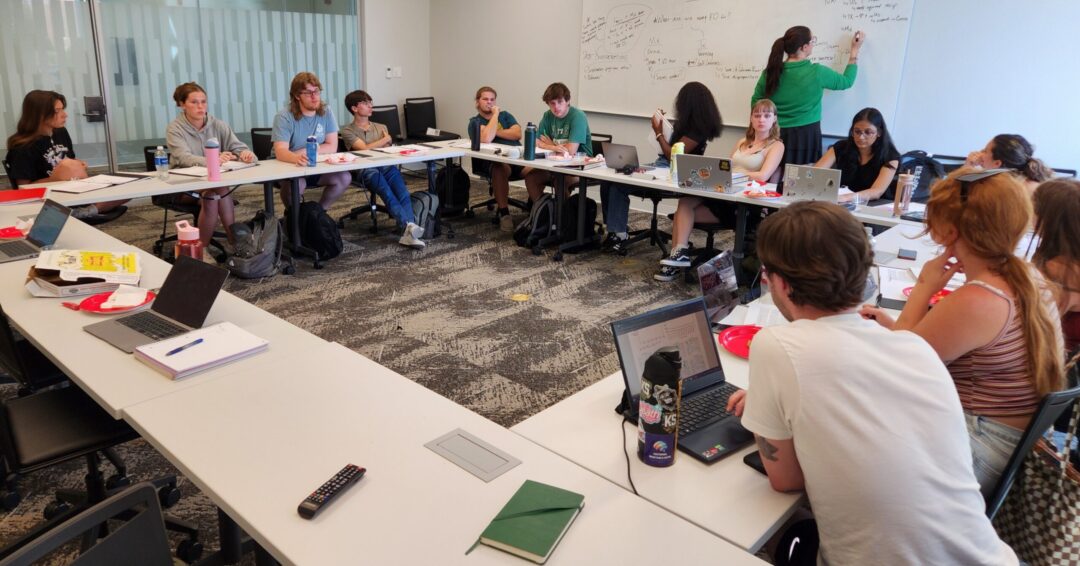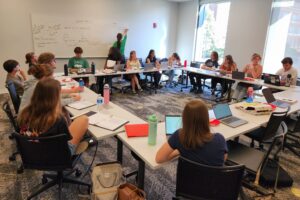 In 2024, the University of Cincinnati experienced a surge in undergraduate interest in its Ethics Bowl team. This enthusiasm allowed UC to field three teams for the Association for Practical and Professional Ethics’ (APPE) Intercollegiate Ethics Bowl regional competitions. When asked about bringing three teams to the Central States Regional Bowl, the event organizer noted it was an unprecedented request!
In 2024, the University of Cincinnati experienced a surge in undergraduate interest in its Ethics Bowl team. This enthusiasm allowed UC to field three teams for the Association for Practical and Professional Ethics’ (APPE) Intercollegiate Ethics Bowl regional competitions. When asked about bringing three teams to the Central States Regional Bowl, the event organizer noted it was an unprecedented request!
Ultimately, two UC teams competed at the Central States Regional Ethics Bowl, held on November 16 at Marian University in Indianapolis, while a third team participated in IEB Online, a virtual Ethics Bowl hosted by the Prindle Institute for Ethics on November 23.
The teams were composed of a diverse group of students, ranging from first-years to graduating seniors, and representing a variety of majors, including philosophy and computer science. The teams also included a mix of returning competitors and newcomers, including one student who previously participated in the Greater Cincinnati Regional High School Ethics Bowl.
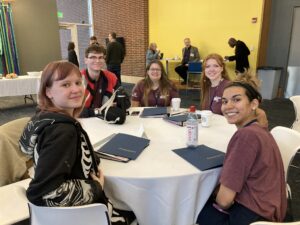 The students spoke highly of their Ethics Bowl experience. Veteran competitor Richy Richardson, a Finance and Economics major, shared, “The Ethics Bowl class taught me (someone with no education in philosophy) basic ethical frameworks and then allowed me to apply those frameworks in the Bowl. I’m thankful for the connections that I was able to make with other UC students in a fun learning environment, and I believe I gained specific skills in listening and restating others’ arguments to provide better moral reasoning.”
The students spoke highly of their Ethics Bowl experience. Veteran competitor Richy Richardson, a Finance and Economics major, shared, “The Ethics Bowl class taught me (someone with no education in philosophy) basic ethical frameworks and then allowed me to apply those frameworks in the Bowl. I’m thankful for the connections that I was able to make with other UC students in a fun learning environment, and I believe I gained specific skills in listening and restating others’ arguments to provide better moral reasoning.”
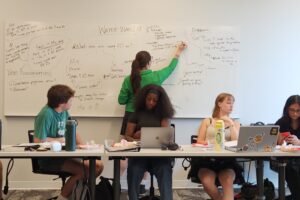 Coaching the teams were Andy Cullison, Executive Director of the Cincinnati Ethics Center, and Brianna (Bri) Larson, a graduate fellow for the Center with nearly five years of Ethics Bowl experience.
Coaching the teams were Andy Cullison, Executive Director of the Cincinnati Ethics Center, and Brianna (Bri) Larson, a graduate fellow for the Center with nearly five years of Ethics Bowl experience.
Although none of the teams advanced to Nationals, their performance was exceptional, especially given the high number of first-time participants. Andy Cullison remarked, “The scores and placements don’t reflect how genuinely incredible these teams were. For instance, one of our teams tied for 10th overall at the Central States Regional, even after facing two of the three teams that advanced to Nationals.” He added that while UC selected the Central States Regional as its potential qualifier for Nationals, the IEB Online team would have qualified if standings were determined by points. In fact, the virtual team scored nearly 30 points higher than one of the semifinalists overall and delivered one of the best primary presentations the coaches saw that year.
Bri Larson added, “I was thrilled with our students’ desire and excitement to dive head-first into some thorny issues. Talking about ethical topics can be quite personal, but our teams did a fantastic job approaching difficult conversations with charitability, curiosity, and openness. Students’ interpersonal skills, critical and creative reasoning skills, and civic dialogue skills noticeably increased as a result of being part of Ethics Bowl.”
To accommodate this growing interest in Ethics Bowl, the program made significant changes this year. The class meeting time was made more flexible to fit students’ schedules, and a new course structure was introduced. Unlike a traditional class, students have large levels of ownership over course structure and competition preparation. Students can choose between a one-credit option (PHIL 1015), which can be taken up to six times, and a three-credit option (PHIL 3015), which can be taken twice. This structure allows students to receive Ethics Bowl course credit for up to four years at UC.
Looking ahead, UC will compete in the Bioethics Bowl in spring 2025, to be held in Salt Lake City.
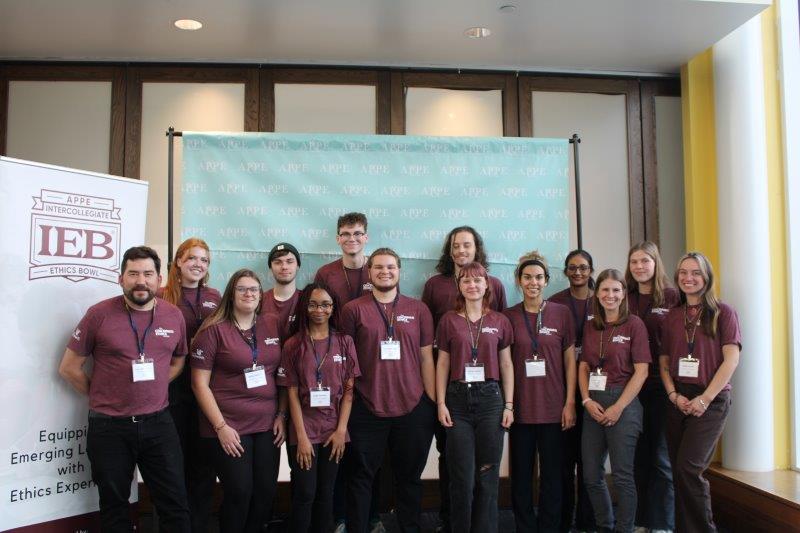
Pictured, left to right, from the APPE IEB Central competition: Coach Andy Cullison, Anna Mack, Bailey Morris, Caden Fraley, Faith Wallace, Richy Richardson, Kaelen Perkins, Pete Siebert, Icarus Lamkin, Nadia Jeelani, Sharvi Kumbhare, Assistant Coach Christina Baulch, Sophie Myres, and Kaya Chase.
Not pictured: Coach Bri Larson and virtual team competitors Nicholas Dumford, Tyler Fields, Justin Keptner, and Marc Santos.

